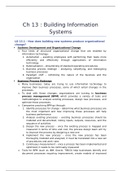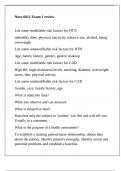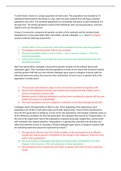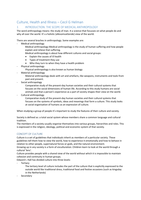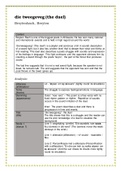Learning Aim C
In this section I will be investigating the principles behind enabling individuals with care and support
needs to overcome challenges.
There are many challenges that individuals will face in a health and social care setting both physical
and emotional due to a variety of reasons. For example, the challenges they face may be:
Awareness and knowledge- for instance, the service user may not be aware of services or
funding needed. Or healthcare professionals are unware of the latest treatments.
Acceptance and beliefs challenges- for example, the carer may be unable to accept that a
person is getting older and is unable to do things for themselves. Or that the service user
may not accept their own limitations.
Practical challenges- the service user may struggle or may be unable to do day to day task
without the assistance of someone.
Skill challenges- this is when the service user may lack the ability to do something, for
example an older person may be unable to use the internet.
Motivational challenges- this is when someone lacks the motivation to do certain tasks. A
carer may lack the motivation to complete a care plan or may lack motivation to carry out
the best standard of care to give just a few examples.
Communication challenges- for instance, the service user may be unable to communicate
due to a speech, sight or hearing problem.
However, there are numerous ways to overcome these challenges that individuals may be faced by.
Firstly, you must be able to correctly identify these challenges and you can do this by using
questionnaires, focus groups, informal conversations and observations of the service users.
Questionnaires would be suitable for discovering challenges when looking at a large group of people,
as this would be less time consuming, and would be more beneficial as it would be a quicker way of
gaining the results. On the other hand, you could use focus groups to identify challenges that
individuals are faced by. A focus group is a small collected group which discusses a particular issue in
which the group can express their ideas and views on the topic. Hence, when this information is
gathered it is used to identify possible challenges. Therefore, health and social care services will be
able to provide services to ensure these challenges are met. Focus groups are useful as it allows
professional and carers to collect detail information about personal groups and feelings.
Furthermore, you can use informal conversation to identify challenges. For example, you may use
this when talking to a service user, as this allows you to gather their opinions and views. Using
informal conversation, will allow the service user to feel that they are not being questioned or
watched. By talking to the service user informally, it will allow you to build up a relationship with
them, and additionally it will enable you to build up a trust with them. By gaining the service user
trust it may allow them to open up more, which will allow you to gain more information on how they
are feeling and will help you to identify challenges that they are being faced with. Lastly, you can use
observation to identify challenges that an individual is being faced by, as observation allows you to
observe problems without having to talk or to use surveys. Observations lets you address and report
challenges that the service user, carer or professional is being faced by before the problem escalates
or becomes worse. Finally, observation can be seen as one of the most important methods of
identifying challenges, as it allows you to visually see the situation from a different perspective,
allowing you to clearly identify each challenge.
,Once you have correctly identified the challenges an individual is being faced by, you will then need
to use numerous strategies to overcome these challenges. For instance, educational information
materials is one of the many techniques that may be used to overcome challenges. Educational
information materials are resources that can be used to teach service users, how to overcome
specific problems. Resources could be a variety of things, including leaflets, posters, web-based
materials, CD’s, newspapers, TV and radio coverage to give just a few examples. By using educational
information materials, it helps to raise awareness and knowledge, as they are presented in a variety
of forms, which provides information’s for individuals who may have communication difficulties. For
example, there may be a leaflet at your GP surgery on how to live healthy, or they may be a poster
demonstrating why smocking is bad and may give you advice on how to overcome this challenge.
Additionally, another strategy that is used to overcome challenges is training courses. These can help
both staff and service users to overcome problems, for example, if a service user had trouble with
communicating and needed a specialist adaption to do this a professional may have to be trained
how to use the adaption. Training courses are run by organisations such as hospitals and local
councils, but they are also offered online, covering an extensive variety of challenges.
Likewise, an alternative strategy to overcome challenges opinion leaders. These are people who are
influential within a group, community or part of society that would use their position to speak on
behalf of others. Opinion leaders can effectively use their influence to help motivate service
providers of going the best possible care for service users. For example, an opinion leader could be
asked to use their position to raise knowledge and awareness of certain condition, that may be not
known.
Furthermore, clinical audits is when current care is reviewed systematically in order to check the
quality of care that is being received against the criteria that it should be meeting. Once the care has
been reviewed, based on the results changes would then be implemented in order to improve the
care being received. For instance, a clinical audit of the level of care hospitals provide for patients
with a chronic condition may illustrate that patient have continued on the same medication for a
couple of years, but new drugs have been developed which might be more beneficial for those
patients suffering with a chronic condition. The aim of a clinical audit, is to improve the level of
patient care, enhanced professionalism and to aid to continuing education. Clinical audits can be
used to overcome challenges and are useful at underlining challenges for both the service provider
and user.
On the other hand, another strategy that can be used to overcome challenges are computer-aided
advice systems. This is any electronic system that can help in the healthcare of a person or a group.
For example, this could be computer aided communication for someone that is unable to speak
either at all or not clearly enough to be understood. Computer-aided advice systems alternatively
supply specific information for the service providers when they need it, for instance to a doctor
when looking at a patient’s medical history.
Lastly, another strategy that can be used to help service users overcome challenges is the patient
mediated strategies, which is anything that could be put into placed based on the feedback or input
from service users about the care they have received or want. For instance, service users could
suggest that they are not sure about how to make a complaint as the information is difficult to
understand. Hence, with this feedback this could lead to a simpler version of the policy being
produced and displayed as to where the service users could make a compliant and would allow the
service user to access the information straightforwardly. By using this strategy, it allows the service
, provider to be educated but also motivates them to ensure that the best quality of care is been
given and if there are any changes that need to be made.
By not letting service users overcome challenges it is likely to have a negative impact on them and
their lives, but it can also affect their health. For instance, it is likely to affect their confidence, self-
esteem and it could cause things like depression and anxiety. Seligman (1965) stated that not letting
someone overcoming a challenge can lead to them feeling depressed, which can cause feelings like
helplessness. As by not overcoming challenges it can lead to people feeling that they cannot help
themselves no more, which causes and triggers things like depression and anxiety.
In Nusrat Patel’s case study there are numerous challenges that Nusrat may face, such as
communication challenges. This is when someone may not be able to communicate due to a speech,
hearing problem or disability. Nusrat may face communication challenges as we are informed that
Nusrat has learning disabilities as well as epilepsy. In particular Nusrat learning disabilities may affect
her communications skills, as research shows that people with learning disabilities are likely to have
difficulties with understanding spoken language. This challenge can be identified by using informal
conversation, as this will allow you to identify the level of struggle and difficulty that Nusrat is
experiencing when communicating. Likewise, you can also use observation, as this will allow you to
observe Nusrat, gauging her ability to communicate when interacting with an induvial. Key things to
look out for would be Nusrat verbal language, for instance whether Nusrat is using appropriate
language, clear speech, formal language or informal language. It is additionally important that
Nusrat body language is observed, as we send out messages to express our ideas and opinions
without talking. When observing Nusrat body language, we should check for things like good
posture, facial expressions, eye contact, appropriate gesture and her use of personal space. Thus, by
using informal conversation and observation it should allow us to see the challenges that Nusrat has
with communication skills. To overcome this challenge, Nusrat could use Makaton sheets, (already
uses these at the community centre) which include speech actions, pictures and diagrams which
help individual who struggle with communication. Thus, a training course could be given to her
advocate and carer, to train them on how to use the Makaton sheets correctly and appropriately.
Nusrat may also face skill challenges due to her learning disabilities, as this could her restrict her
from doing certain activities. Skill challenges is when you lack the ability to do something. For
example, when participating in the drama class Nusrat may lack the ability to talk clearly enough
hence she may not be understood. However, to overcome this challenge Nusrat could use computer
aided advice system, which is specialist technology that could be computer aided communication to
help Nusrat communicate to other members of the class through pictures, symbols, letters, number
and words. Lastly, Nusrat may face practical challenges which is when you are unable to day to day
tasks. Nusrat may face practical challenges as we are aware that Nusrat epilepsy is currently not
controlled, hence when going to the bathroom, Nusrat has to have someone with her, as if Nusrat
has a seizure emergency action can be taken place. Hence, Nusrat does not have independence as
she has to be accompanied at all times and her epilepsy affects her to carry out day to day tasks. This
challenge can be identified through observation as by observing Nusrat you will be able to identify
the practical problems she encounters. A strategy that could overcome Nusrat practical challenges
would be to find a solution on how to get Nusrat’s epilepsy controlled. For instance, Nusrat could go
back to her G.P, and find out what other medication will help to control her epilepsy,
If Nusrat does not overcome these challenges it could impact her in numerous ways. For instance, if
Nusrat does not overcome her communication challenges it may result in her losing confidence,
which may then make the situation worse, as Nusrat may become quieter in herself, and may no
In this section I will be investigating the principles behind enabling individuals with care and support
needs to overcome challenges.
There are many challenges that individuals will face in a health and social care setting both physical
and emotional due to a variety of reasons. For example, the challenges they face may be:
Awareness and knowledge- for instance, the service user may not be aware of services or
funding needed. Or healthcare professionals are unware of the latest treatments.
Acceptance and beliefs challenges- for example, the carer may be unable to accept that a
person is getting older and is unable to do things for themselves. Or that the service user
may not accept their own limitations.
Practical challenges- the service user may struggle or may be unable to do day to day task
without the assistance of someone.
Skill challenges- this is when the service user may lack the ability to do something, for
example an older person may be unable to use the internet.
Motivational challenges- this is when someone lacks the motivation to do certain tasks. A
carer may lack the motivation to complete a care plan or may lack motivation to carry out
the best standard of care to give just a few examples.
Communication challenges- for instance, the service user may be unable to communicate
due to a speech, sight or hearing problem.
However, there are numerous ways to overcome these challenges that individuals may be faced by.
Firstly, you must be able to correctly identify these challenges and you can do this by using
questionnaires, focus groups, informal conversations and observations of the service users.
Questionnaires would be suitable for discovering challenges when looking at a large group of people,
as this would be less time consuming, and would be more beneficial as it would be a quicker way of
gaining the results. On the other hand, you could use focus groups to identify challenges that
individuals are faced by. A focus group is a small collected group which discusses a particular issue in
which the group can express their ideas and views on the topic. Hence, when this information is
gathered it is used to identify possible challenges. Therefore, health and social care services will be
able to provide services to ensure these challenges are met. Focus groups are useful as it allows
professional and carers to collect detail information about personal groups and feelings.
Furthermore, you can use informal conversation to identify challenges. For example, you may use
this when talking to a service user, as this allows you to gather their opinions and views. Using
informal conversation, will allow the service user to feel that they are not being questioned or
watched. By talking to the service user informally, it will allow you to build up a relationship with
them, and additionally it will enable you to build up a trust with them. By gaining the service user
trust it may allow them to open up more, which will allow you to gain more information on how they
are feeling and will help you to identify challenges that they are being faced with. Lastly, you can use
observation to identify challenges that an individual is being faced by, as observation allows you to
observe problems without having to talk or to use surveys. Observations lets you address and report
challenges that the service user, carer or professional is being faced by before the problem escalates
or becomes worse. Finally, observation can be seen as one of the most important methods of
identifying challenges, as it allows you to visually see the situation from a different perspective,
allowing you to clearly identify each challenge.
,Once you have correctly identified the challenges an individual is being faced by, you will then need
to use numerous strategies to overcome these challenges. For instance, educational information
materials is one of the many techniques that may be used to overcome challenges. Educational
information materials are resources that can be used to teach service users, how to overcome
specific problems. Resources could be a variety of things, including leaflets, posters, web-based
materials, CD’s, newspapers, TV and radio coverage to give just a few examples. By using educational
information materials, it helps to raise awareness and knowledge, as they are presented in a variety
of forms, which provides information’s for individuals who may have communication difficulties. For
example, there may be a leaflet at your GP surgery on how to live healthy, or they may be a poster
demonstrating why smocking is bad and may give you advice on how to overcome this challenge.
Additionally, another strategy that is used to overcome challenges is training courses. These can help
both staff and service users to overcome problems, for example, if a service user had trouble with
communicating and needed a specialist adaption to do this a professional may have to be trained
how to use the adaption. Training courses are run by organisations such as hospitals and local
councils, but they are also offered online, covering an extensive variety of challenges.
Likewise, an alternative strategy to overcome challenges opinion leaders. These are people who are
influential within a group, community or part of society that would use their position to speak on
behalf of others. Opinion leaders can effectively use their influence to help motivate service
providers of going the best possible care for service users. For example, an opinion leader could be
asked to use their position to raise knowledge and awareness of certain condition, that may be not
known.
Furthermore, clinical audits is when current care is reviewed systematically in order to check the
quality of care that is being received against the criteria that it should be meeting. Once the care has
been reviewed, based on the results changes would then be implemented in order to improve the
care being received. For instance, a clinical audit of the level of care hospitals provide for patients
with a chronic condition may illustrate that patient have continued on the same medication for a
couple of years, but new drugs have been developed which might be more beneficial for those
patients suffering with a chronic condition. The aim of a clinical audit, is to improve the level of
patient care, enhanced professionalism and to aid to continuing education. Clinical audits can be
used to overcome challenges and are useful at underlining challenges for both the service provider
and user.
On the other hand, another strategy that can be used to overcome challenges are computer-aided
advice systems. This is any electronic system that can help in the healthcare of a person or a group.
For example, this could be computer aided communication for someone that is unable to speak
either at all or not clearly enough to be understood. Computer-aided advice systems alternatively
supply specific information for the service providers when they need it, for instance to a doctor
when looking at a patient’s medical history.
Lastly, another strategy that can be used to help service users overcome challenges is the patient
mediated strategies, which is anything that could be put into placed based on the feedback or input
from service users about the care they have received or want. For instance, service users could
suggest that they are not sure about how to make a complaint as the information is difficult to
understand. Hence, with this feedback this could lead to a simpler version of the policy being
produced and displayed as to where the service users could make a compliant and would allow the
service user to access the information straightforwardly. By using this strategy, it allows the service
, provider to be educated but also motivates them to ensure that the best quality of care is been
given and if there are any changes that need to be made.
By not letting service users overcome challenges it is likely to have a negative impact on them and
their lives, but it can also affect their health. For instance, it is likely to affect their confidence, self-
esteem and it could cause things like depression and anxiety. Seligman (1965) stated that not letting
someone overcoming a challenge can lead to them feeling depressed, which can cause feelings like
helplessness. As by not overcoming challenges it can lead to people feeling that they cannot help
themselves no more, which causes and triggers things like depression and anxiety.
In Nusrat Patel’s case study there are numerous challenges that Nusrat may face, such as
communication challenges. This is when someone may not be able to communicate due to a speech,
hearing problem or disability. Nusrat may face communication challenges as we are informed that
Nusrat has learning disabilities as well as epilepsy. In particular Nusrat learning disabilities may affect
her communications skills, as research shows that people with learning disabilities are likely to have
difficulties with understanding spoken language. This challenge can be identified by using informal
conversation, as this will allow you to identify the level of struggle and difficulty that Nusrat is
experiencing when communicating. Likewise, you can also use observation, as this will allow you to
observe Nusrat, gauging her ability to communicate when interacting with an induvial. Key things to
look out for would be Nusrat verbal language, for instance whether Nusrat is using appropriate
language, clear speech, formal language or informal language. It is additionally important that
Nusrat body language is observed, as we send out messages to express our ideas and opinions
without talking. When observing Nusrat body language, we should check for things like good
posture, facial expressions, eye contact, appropriate gesture and her use of personal space. Thus, by
using informal conversation and observation it should allow us to see the challenges that Nusrat has
with communication skills. To overcome this challenge, Nusrat could use Makaton sheets, (already
uses these at the community centre) which include speech actions, pictures and diagrams which
help individual who struggle with communication. Thus, a training course could be given to her
advocate and carer, to train them on how to use the Makaton sheets correctly and appropriately.
Nusrat may also face skill challenges due to her learning disabilities, as this could her restrict her
from doing certain activities. Skill challenges is when you lack the ability to do something. For
example, when participating in the drama class Nusrat may lack the ability to talk clearly enough
hence she may not be understood. However, to overcome this challenge Nusrat could use computer
aided advice system, which is specialist technology that could be computer aided communication to
help Nusrat communicate to other members of the class through pictures, symbols, letters, number
and words. Lastly, Nusrat may face practical challenges which is when you are unable to day to day
tasks. Nusrat may face practical challenges as we are aware that Nusrat epilepsy is currently not
controlled, hence when going to the bathroom, Nusrat has to have someone with her, as if Nusrat
has a seizure emergency action can be taken place. Hence, Nusrat does not have independence as
she has to be accompanied at all times and her epilepsy affects her to carry out day to day tasks. This
challenge can be identified through observation as by observing Nusrat you will be able to identify
the practical problems she encounters. A strategy that could overcome Nusrat practical challenges
would be to find a solution on how to get Nusrat’s epilepsy controlled. For instance, Nusrat could go
back to her G.P, and find out what other medication will help to control her epilepsy,
If Nusrat does not overcome these challenges it could impact her in numerous ways. For instance, if
Nusrat does not overcome her communication challenges it may result in her losing confidence,
which may then make the situation worse, as Nusrat may become quieter in herself, and may no

